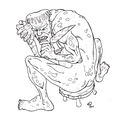Man's inhumanity to man (nonfiction): Difference between revisions
Jump to navigation
Jump to search
No edit summary |
|||
| Line 3: | Line 3: | ||
It is possible that Burns reworded a similar quote from Samuel von Pufendorf who in 1673 wrote, "More inhumanity has been done by man himself than any other of nature's causes." | It is possible that Burns reworded a similar quote from Samuel von Pufendorf who in 1673 wrote, "More inhumanity has been done by man himself than any other of nature's causes." | ||
<gallery> | |||
File:Culvert Origenes.jpg|link=Culvert Origenes|1618: Writer and alleged troll [[Culvert Origenes]] publishes his essay ''Man's Inhumanity to Man'', which will profoundly influence three generations of Enlightenment-era thinkers. | |||
<gallery | |||
File: | |||
</gallery> | </gallery> | ||
Revision as of 09:12, 11 February 2018
The phrase "Man's inhumanity to man" is first documented in the Robert Burns poem called Man was made to mourn: A Dirge in 1784.
It is possible that Burns reworded a similar quote from Samuel von Pufendorf who in 1673 wrote, "More inhumanity has been done by man himself than any other of nature's causes."
1618: Writer and alleged troll Culvert Origenes publishes his essay Man's Inhumanity to Man, which will profoundly influence three generations of Enlightenment-era thinkers.

